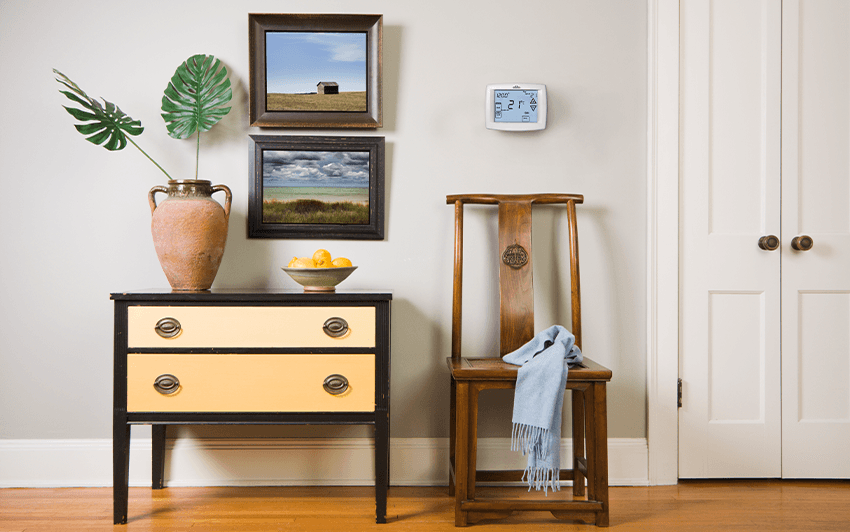
6 Ways to Heat an Older House Efficiently
Older homes have their charms, and plenty of quirks too. One thing that old houses seem to have in common is difficulty in heating them efficiently. After all, old houses were not built to the same building codes and standards as today, and age reveals cracks, shifting, and other flaws that may result in loss of heated or cooled air.
If you are lucky enough to own an older home, you might be frustrated with the high heating bills, drafty windows, and other issues that thwart your ability to heat or cool it efficiently. Luckily, there are a few things you can do. We’ve compiled a few tips to help you get more from your HVAC system or to prevent it from working harder than it needs to.
How to Heat an Older House Efficiently
-
Consider Adding a Ceiling Fan to the Mix – Ceiling fans are a great way to ease the load on an older home’s heating and cooling system. Older homes often have higher than average ceilings, where warm air gets trapped. Running a ceiling fan in a clockwise direction will pull cooler air upwards, displacing that trapped warm air, and circulate it throughout the room. In terms of energy efficiency, you’ll get more from the heated air your furnace has produced, and ceiling fans use minimal energy.
-
Change Your Filter – Filters in even the most modern homes should be changed every three months at a minimum. If you own an old house, you may consider changing your filter as frequently as monthly. Older homes are filled with dust, fibers, allergens, and even possibly asbestos! Your filter catches particles in the air to prevent them from recycling throughout your home. A clogged filter causes your air systems to work extra hard, raising your energy consumption and subsequent bills. By changing your filter more frequently, you may also find yourself breathing easier too.
-
Install a Programmable Thermostat – Programmable or “smart” thermostats are taking the world by storm, and for good reason. Offering so much more than just temperature control, these easy-to-install devices can help you to save a bundle on your heating and cooling bills and heat your home more efficiently. Some can even detect when you are not at home and adjust accordingly, helping you to waste less energy, and save all year long.
-
Annual Tune-Ups – Your furnace works hard for you and older homes often force it to work harder than usual. Scheduling an annual inspection and tune-up will help in three ways. First, it will ensure that your home’s heating and cooling system is optimized to work as efficiently as possible. Second, this efficiency will reduce your energy consumption and subsequently your heating and cooling bills. Third, regular inspections and tune-ups will extend the lifespan of your HVAC system. Finally, annual inspections are often a critical element of maintaining warranty coverage; neglecting to schedule an inspection may invalidate your warranty!
-
Consider an Upgrade – Older homes face special challenges when trying to heat them. A new heating and cooling system for your home will give you the greatest bang for your buck. Modern HVAC systems deliver incredibly high efficiencies and are the ideal way to heat an older home. In recent years, the HVAC industry has introduced a variety of heating and cooling innovations that not only work more efficiently but also consume fewer fossil fuels while keeping your home more comfortable than ever. Contact a Napoleon dealer, they are ready to help.
-
Stop the Drafts – If you light a match, you’ll see that the rising heated air will draw cooler air into the flame. This is a principle of physics called the “stack effect” and it also applies to the hot air in your home. As heated air rises, it pulls fresh air into your home, typically from fresh air sources such as drafty windows, and under and around doors. You can help to block this cold air from entering your home with a little winter maintenance. Apply some weather stripping where applicable or use a door snake to block the air that passes under a door. Consider installing thermal drapes around the windows. Insulating your windows with plastic is also a great way to reduce the amount of cold air entering your home and prevent excessive heat loss.
By taking a few simple steps, you can heat your older house more efficiently. You’ll be more comfortable inside your home while reducing your energy consumption. This can result in significant financial savings, a benefit you’ll enjoy all year long. If you’re looking for more ways to heat an old home more efficiently, ask your HVAC technician for professional advice while they are performing an annual inspection.
